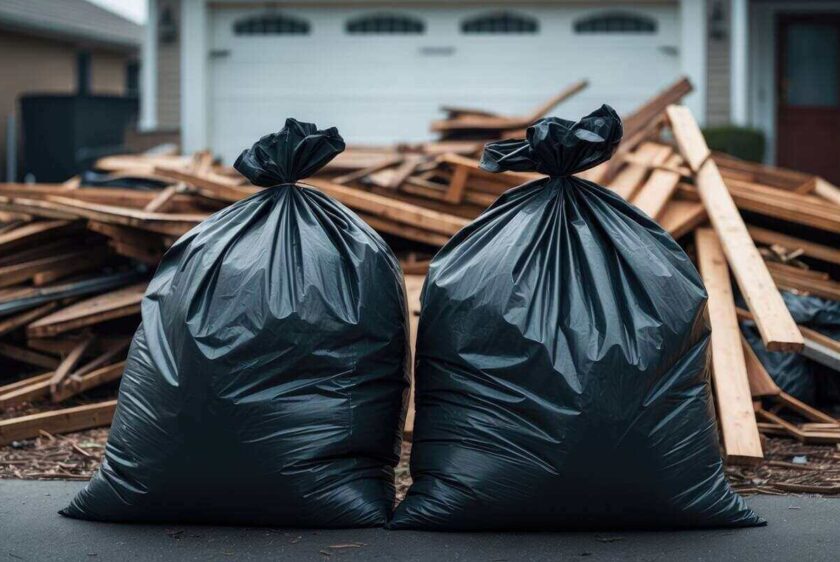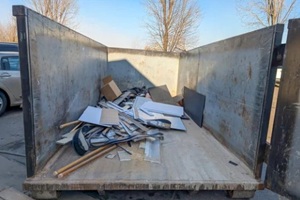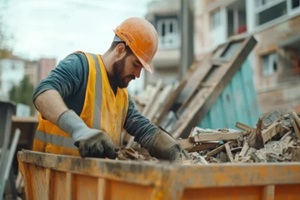
How to Avoid Fines and Code Violations During Bulk Trash Removal
Downsizing a home, cleaning a garage, or making a big move can be a labor-intensive process, but bulk trash removal can make it easier. However, when renovating, moving, or simply spring cleaning, homeowners should be aware of how local regulations can impact their bulk trash removal efforts. Improper disposal can lead to code violations or even fines.
For more success, I assembled this guide to help homeowners avoid fines and other consequences during bulk trash removal. This article focuses on the Virginia area, but many of these codes and regulations have equivalents in every state that homeowners should know about before downsizing.
What are Waste Disposal Codes?

The Code of Virginia covers waste disposal, and mandates how individuals can legally dispose of solid waste, as well as the disposal methods that are not allowed. Here are some of the most prominent regulations relevant to homeowners during the bulk trash removal process:
Code of Virginia 10.1 – 1418.1 Improper disposal of solid waste
This code establishes that it is the responsibility of the person disposing of waste to do so properly. This forbids disposing of solid waste on any land without the landowner’s permission. It also establishes the civil penalties that will apply if broken, including a fine of up to $5,000. “Solid waste” in this case includes appliances and construction materials to furniture and smaller belongings.
Code of Virginia 33.2 – 802 Dumping Trash
It is unlawful to dispose of any garbage, trash, or refuse on public or private property. It specifically denotes highways and land by highways as examples. This is a misdemeanor offense; failing to comply with this law can result in up to 12 months in jail or a fine of $500-$2,500.
Virginia Beach Code Chapter 31 Sec. 31-8 – Disposal of refuse and debris from construction, demolition, etc., operations
This municipal code restricts the disposal of construction debris. If homeowners need to remove material waste from projects such as building, construction, land-clearing, demolition, repair, or dredging, it must be removed by the owner or contractor and legally discarded. The city of Virginia Beach is not responsible for collecting or discarding this debris. Therefore, placing the debris near an active road or on public or private property for pick-up is a punishable offense.
Trash Removal Laws Summary
While there are more laws, codes, and regulations governing bulk trash removal, they all follow a similar pattern that homeowners can use as a checklist of forbidden disposal methods:
- Dumping trash on private property without permission.
- Dumping trash on or near a public roadway or eject it from a moving vehicle.
- Dumping trash on state or city property, including sidewalks and right-of-ways.
- Putting trash by the roadside for pick-up unless a city code permits it.
- Storing or disposing of hazardous materials except by following state-mandated processes or to mix hazardous materials into bulk trash piles.
- Using commercial dumpsters for personal waste without permission.
There are many more to consider, and if not listed here, should be research through the Code of Virginia or Virginia Beach Code of Ordinances. Following a safe strategy for bulk trash disposal that addresses the intentions of these and other possible laws can be made simple using a provider of bulk trash removal.
Steps to Prevent Code Violations

Homeowners in need of bulk trash disposal can follow these simple steps to avoid fines and prevent code violations:
1. Check Local Ordinances
Cities, counties, and states usually have waste management websites or offices. Visit or call to confirm the legal process of bulk trash disposal in that area. One common mistake many homeowners make is asking friends or neighbors how they dispose of waste, which may not always be currently legal.
2. Organize the Waste
A clear organization system helps homeowners follow local codes since different types of debris often have different disposal requirements. Property owners should separate wood, appliances, metal, and glass to make it easier to identify. Note any potentially hazardous debris and separate it from the rest.
3. Document the Process
Photo evidence of the cleanup effort can be beneficial documentation if needed later. REcord the correct cleanup process to show property managers or city officials if compliance becomes an issue.
4. Partner with Licensed Disposal Experts
The best way to make sure that bulk trash disposal complies with local laws is to partner with a professional waste removal company. These companies are registered with the state, understand disposal compliance requirements, and handle the disposal process to save homeowners the hassle while preventing costly mistakes.
Book Your Hampton Roads Bulk Trash Removal Today

Downsizing a home or eliminating built-up debris can be liberating. However, doing so in the wrong way can result in fines, code violations, and potential legal consequences due to how cities and states regulate trash disposal. At Full Strut Disposal, our team has years of experience legally disposing of waste in the Virginia Beach area. We understand the state and municipal codes and rules governing safe and legal bulk trash disposal.
Our goal is to protect homeowners from fines and violations by doing the heavy lifting for them while following city rules. Contact our team today to learn how we take the stress out of bulk trash disposal.
"*" indicates required fields



